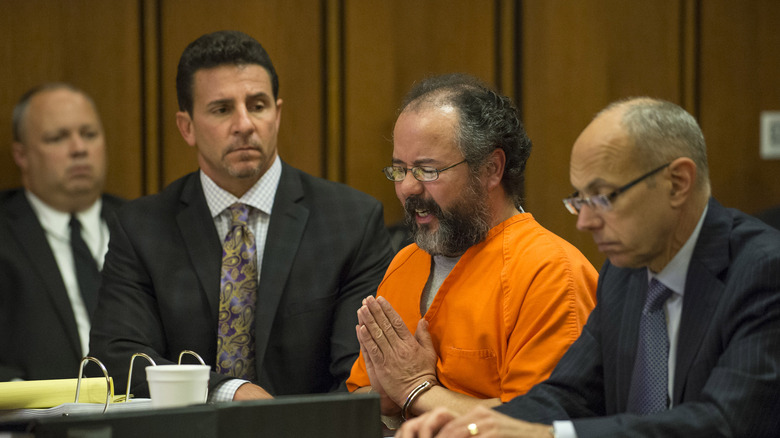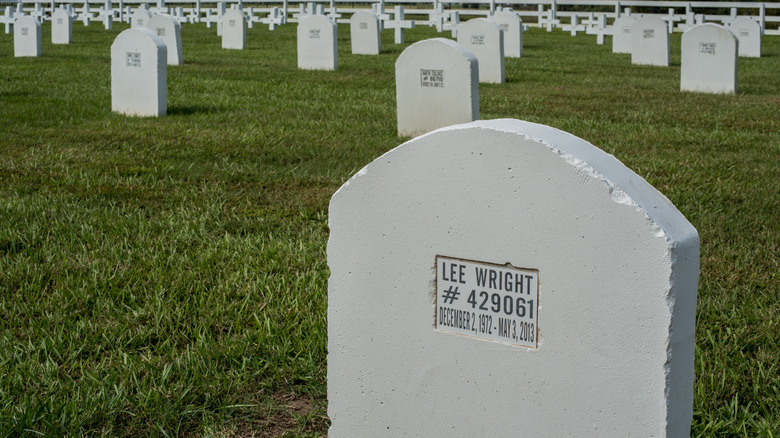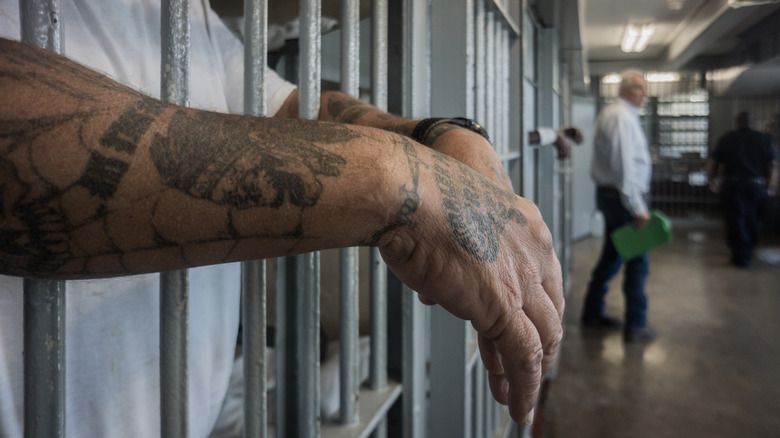What It Really Means When Someone Is Sentenced To Life In Prison
It's a sentence easy to grasp in the abstract: life in prison. When the possibility of parole is removed, it becomes even simpler. But it's one thing to hear that a human being has been sentenced to spend the rest of their days behind bars, and quite another to endure it.
Prison Writers provides a platform for convicts to share their stories. One of them, Leonard Scovens, wrote about the psychological toll a life sentence takes from its earliest days, particularly on someone convicted at 23 as he was. "I spent the first few years ... muttering incoherently to myself and chewing my fingernails to bleeding nubs while I contemplated the most painless methods of suicide for American prisoners." Scovens described the coping mechanisms of older inmates who were sentenced to life: religion, drugs (either smuggled in or cooked up in cells), imaginary friends, trading sex for privileges, or acceptance of a violent criminal lifestyle. Deprived of so many other freedoms, Scovens took solace in sky-watching.
Another convict, Quentin Jones, described life sentences as "death by incarceration." Meditation and music were his tools for enduring his sentence, handed down when he was 18, but the harsh conditions of his incarceration left their mark by the time he wrote his article 20 years later. The hard beds ruined his back, sharing a cell with seven other men reminded him of slavery, and the fear — and likely reality — of dying in prison was an ever-looming specter.
The United States relies heavily on life sentences
A study by The Sentencing Project found that over 203,000 Americans were serving life sentences in 2021 (via The Washington Post). That came to 15% of the U.S. prison population and 40% of the worldwide number of people sentenced to life. The numbers are more stark when looking at incarcerated people who serve life without the possibility of parole; 83% of such convicted felons worldwide are incarcerated in the U.S. For comparison, the United Kingdom has a total of 70 life-without-parole inmates as of 2023 out of a total prison population of just over 95,000, per the House of Commons Library. The sentence was only introduced in 1983 according to The Telegraph. The Sentencing Project has argued that even prison terms exceeding 20 years are rare outside the United States.
How inflexible American life sentences can be has varied by time and state. Alaska does not allow life sentences without parole, but per NPR, Louisiana's life sentences have grown increasingly harsh. From allowing a request for commutation as soon as 10 years in during the 1920s, the state converted all death sentences to life after the death penalty was briefly struck down in 1972, and followed up that decision with higher thresholds for seeking parole. Currently, Louisiana's life sentences are just that: for life, with no option for parole. The state prison at Angola has filled an entire cemetery with imprisoned people who died behind bars without hope of release, and a second cemetery will soon be full too.
There is a movement to end most life sentences
The Sentencing Project, an advocacy group dedicated to minimizing incarceration, found an explosion in the prison population after the 1970s, with life sentences without the possibility of parole reaching their highest recorded levels by 2020. Policies enacted during the 1980s and 1990s have been implemented in a way that disproportionately affects marginalized communities, and many life sentences issued in those decades would not be made today. The cost of maintaining such a large prison population has been estimated at $1 million per inmate once a convict has reached 40 years served, and Mother Jones reported on comparable issues with testimony and evidence used to issue life sentences as with the death penalty, with additional limitations on appeals and legal protections. Some contributors to Prison Writers have argued that life without parole is a worse fate than death row.
In answer to these conditions, The Sentencing Project promotes reforms that would eliminate life without parole as a sentence and limit all "life" sentences to 20 years, with exceptions made for a limited number of cases to be determined by a court.


